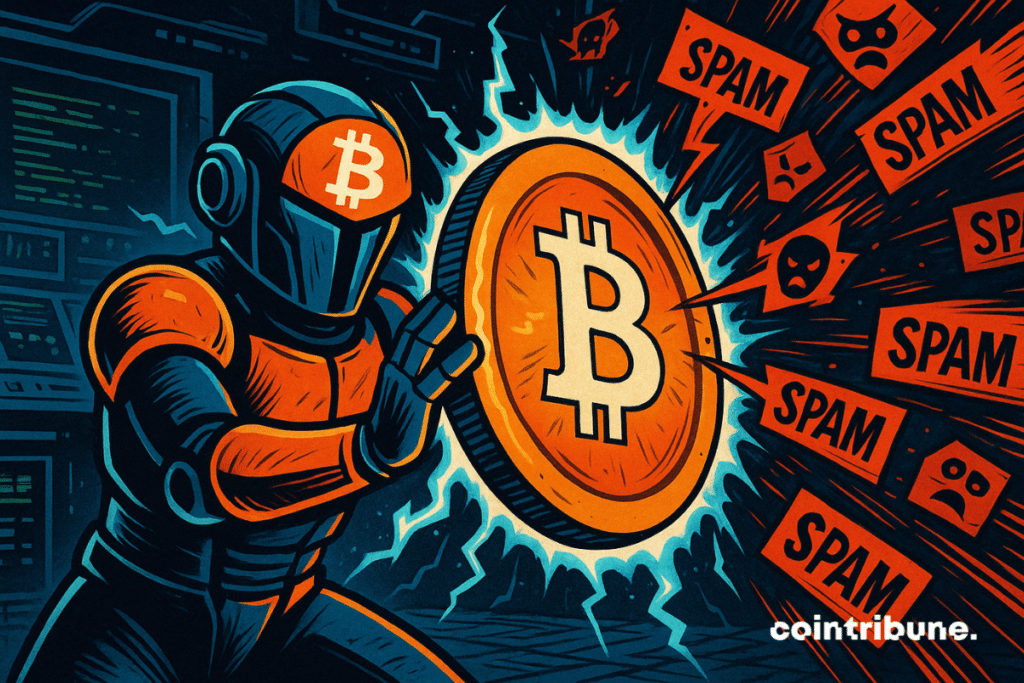Bitcoin Under Siege: Spam Attack Sparks Nuclear Fee Debate
Miners push drastic fee overhaul—halving block rewards, hiking transaction costs. Purists scream ’betrayal’ while speculators shrug and adjust their algo trades.
The fix? A scorched-earth policy against spam transactions. Critics call it a tax on small holders; devs insist it’s survival. Meanwhile, Wall Street quietly adds ’fee volatility’ to their risk models—right after ’regulatory uncertainty’ and before ’Elon tweets.’

In brief
- GrassFedBitcoin revives the idea of filtering inscriptions via pull request #28408.
- Ammous financially supports an anti-spam developer to cleanse the Bitcoin protocol.
- Adam Back mentions an endless race between spammers and filters, implying potential inefficiency.
- The debate reveals a divide between strict monetary uses and absolute on-chain freedoms.
Filters for Bitcoin: A Disruptive Idea
GrassFedBitcoin wants to. It would allow bitcoin nodes to automatically filter the infamous “inscriptions.” These data, often images, saturate blocks without real monetary utility. For him, this is a deviation. He states:
No one wants to relay inscriptions. Give them tools for this purpose, make them configurable, and define a default policy that makes bitcoin as a whole more conducive to monetary activity – and not to storing JPGs.
He adds that previous increases in the OP_RETURN limit were based on false assumptions. He calls forfavoring financial transactions and discouraging image storage. This position, although supported, is not unanimous.
Adam Back, CEO of Blockstream, tempers the enthusiasm. For him, it is. He explains that spam can always disguise itself as valid code: “The code is infinitely variable“, he says. Therefore, spammers can always bypass filters.
But for GrassFedBitcoin,. “If you give me filters, I will use them“, he asserts. His argument: with sufficient adoption, spam decreases due to technical constraints.
Bitcoin or Bitstore? The Protocol’s Identity at Stake
It touches the very soul of Bitcoin. Is it a store of value or a JPEG file repository? For Ammous, it’s clear: action is required. “It’s not easy, but it’s worth trying to ruin spammers faster“, he writes. He insists: filtering is not censorship.
. So filtering is a usage right, not an attack on freedom.
But opposition remains strong. Some talk of authoritarian drift, others defend their. More technical voices point out that current spams exploit the signature witness (witness discount), which is supposed to reduce the UTXO base but actually increases it in practice.
Here is a summary of the sticking points:
- The average block could reach 4 MB with inscriptions (source: Mempool Research);
- The current block is around 1.5 MB;
- The signature witness is diverted from its original function;
- Filters can reduce spam in a non-linear way;
- Forks like Knots already offer these options, but few are adopted.
Behind these figures,. Some want a clean Bitcoin, focused on money. Others, a space for expression without constraints. Two utopias clash.
BTCUSD chart by TradingViewRecently, OP_RETURN has already generated a lot of ink. As proposals harden, it seems the entire Bitcoin structure is ready to shift. More than a debate on spam, this might be a profound identity turning point for the protocol.
Maximize your Cointribune experience with our "Read to Earn" program! For every article you read, earn points and access exclusive rewards. Sign up now and start earning benefits.

